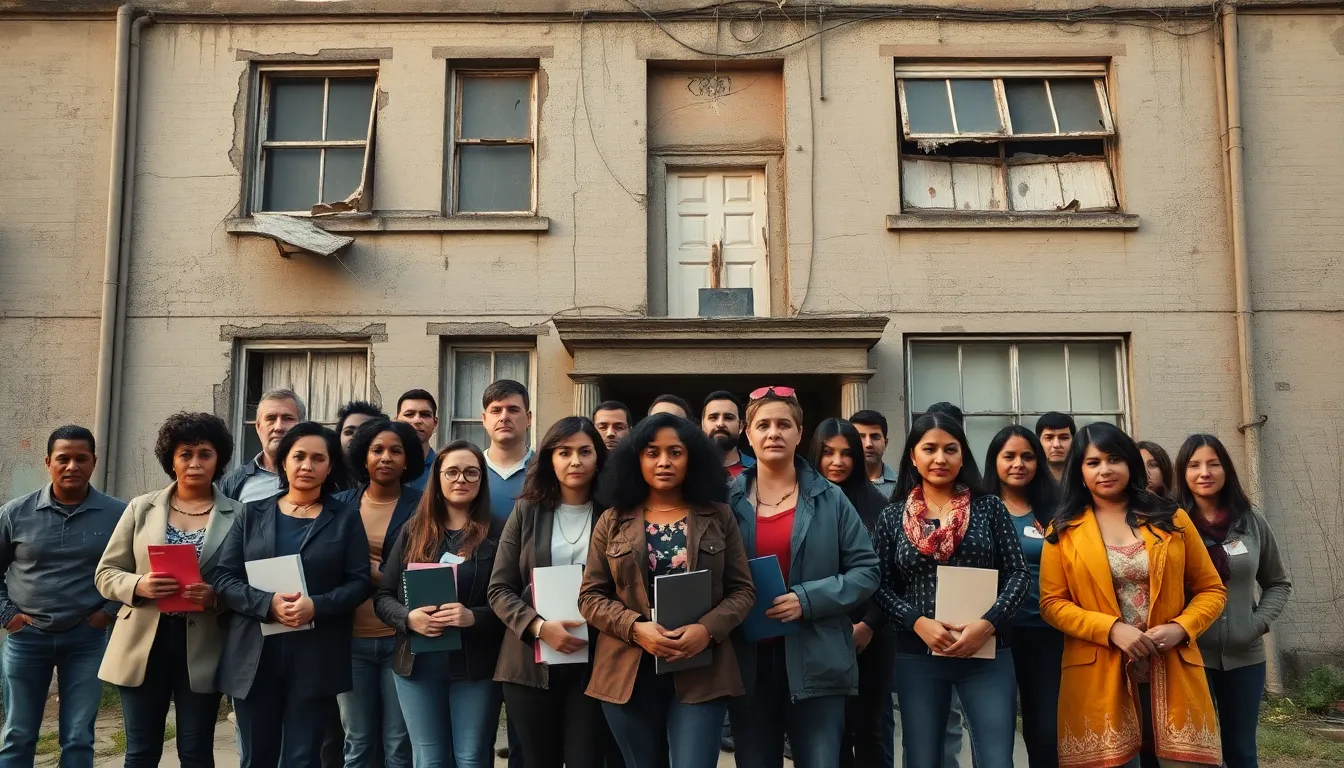Table of Contents
ToggleIn the world of real estate, not all landlords wear capes. Some, affectionately dubbed “slumlords,” manage properties that could use a little TLC—or maybe a complete overhaul. For tenants stuck in these less-than-ideal living situations, knowing their legal options is crucial. After all, nobody wants to be the star of a horror story featuring moldy walls and broken heaters.
Understanding Slumlords
Slumlords refer to landlords who neglect their properties and fail to provide safe living conditions. Recognizing their characteristics is crucial for tenants facing such issues.
Definition and Characteristics
Slumlords manage rental properties known for poor maintenance and hazardous conditions. They often prioritize profit over tenant welfare. Common features include inadequate repairs, failure to ensure basic utilities, and non-compliance with housing regulations. Many slumlords ignore tenant complaints, opting instead to let conditions deteriorate. Some landlords simply lack the resources to maintain properties, leading to substandard living environments. Consequences for tenants can include health risks and loss of habitability.
Common Issues Faced by Tenants
Tenants in slum conditions frequently encounter a range of issues. Mold growth poses health risks, while broken heating systems lead to discomfort in colder months. Unstable plumbing and electrical systems create unsafe living spaces. Additionally, pest infestations commonly occur in poorly maintained properties. Tenants often struggle with limited access to essential services, which can exacerbate existing problems. Legal recourse can prove challenging, as many tenants lack knowledge of their rights. Understanding these issues is vital for anyone living in substandard housing.
Legal Rights of Tenants
Tenants have specific legal rights designed to protect them in rental situations. Understanding these rights empowers tenants to address issues associated with slumlords effectively.
Tenant Protection Laws
Tenant protection laws vary by state, but common provisions exist across many jurisdictions. Laws typically require landlords to maintain safe, habitable conditions. Legal frameworks often enable tenants to report unsafe living conditions and seek repairs. Damages may be available for failure to address serious issues like mold or pest infestations. Landlords who neglect their responsibilities risk facing financial penalties. Additionally, some states enforce rent control measures, limiting increases without justification. Familiarity with local laws helps tenants exercise their rights and advocate for better living conditions.
The Role of Local Housing Authorities
Local housing authorities play a crucial role in safeguarding tenant rights. These agencies often inspect rental properties, ensuring compliance with health and safety standards. They assist tenants in filing complaints against negligent landlords. Local authorities may provide resources and guidance on legal options, helping tenants navigate the complexities of housing law. Outreach programs educate tenants about their rights, fostering awareness and advocacy. In cases of severe disrepair, housing authorities can intervene, facilitating necessary repairs. Engaging with these organizations enhances tenants’ chances of achieving a resolution and improving their living situation.
Exploring Slumlord Legal Options
Tenants dealing with slumlords have multiple legal avenues to pursue. Many choose to file a formal complaint with local housing authorities, prompting inspections of the properties. Legal actions against slumlords range from seeking repairs in court to pursuing financial compensation for damages endured. Some tenants opt for small claims court, where they can present their case without needing a lawyer. Documentation of the poor living conditions, including photographs and written communications, significantly strengthens cases against slumlords. Knowledge of state and local tenant laws allows tenants to navigate the legal landscape effectively.
Legal Actions Against Slumlords
Taking legal action serves as a significant option for many tenants. Various avenues include filing a lawsuit for breach of contract due to uninhabitable conditions. Courts often grant tenants various remedies, like compensation for expenses caused by the landlord’s negligence or ordering repairs. Seeking legal counsel may provide invaluable guidance, allowing tenants to explore all possible routes. For instance, some tenants pursue tenant unions or legal aid organizations, which can offer resources and additional support. Timing matters when documenting grievances, positioning tenants for success in any legal action taken.
Alternative Dispute Resolution Methods
Alternative dispute resolution offers tenants a way to resolve issues without the complexities of court. Mediation stands out as a popular option, allowing both parties to discuss concerns with a neutral third party. This method encourages communication and often leads to mutually beneficial agreements. Another approach involves arbitration, where a designated arbitrator makes binding decisions after reviewing the case. Tenants might find these alternatives faster and less stressful than traditional legal proceedings. Engaging in these processes helps tenants establish a clear path toward resolving disputes with slumlords while preserving their rights.
Resources for Tenants
Tenants facing issues with slumlords can access various resources to support their legal rights and improve their living conditions. These organizations offer guidance, assistance, and additional options to navigate challenging situations effectively.
Legal Aid Organizations
Legal aid organizations provide valuable support for tenants requiring assistance with housing disputes. These nonprofits often offer free or low-cost legal representation, ensuring tenants understand their rights and options. Cases involving unsafe living conditions may benefit from expert legal advice and advocacy. Many legal aid programs hold community workshops focused on educating tenants about their rights under local and state laws. This education is essential for navigating disputes effectively.
Tenant Advocacy Groups
Tenant advocacy groups work to protect tenant rights and promote fair housing practices. These organizations often mobilize to address slumlord practices and demand better living conditions. They provide resources such as informational pamphlets, workshops, and direct assistance for tenants experiencing unsafe environments. Working closely with local officials helps advocacy groups drive policy changes that benefit renters. Connecting with these groups empowers tenants to stand up against neglectful landlords and fosters a sense of community among those facing similar challenges.
Conclusion
Navigating the challenges posed by slumlords can be daunting for tenants. However understanding legal rights and available options is essential for fostering safer living conditions. By actively engaging with local housing authorities and utilizing resources from tenant advocacy groups, individuals can assert their rights effectively.
Documenting living conditions and seeking legal assistance can significantly enhance a tenant’s ability to address grievances. Exploring alternative dispute resolution methods may also provide a less stressful path to resolution. Ultimately empowering oneself with knowledge and support is key to overcoming the obstacles posed by neglectful landlords.





